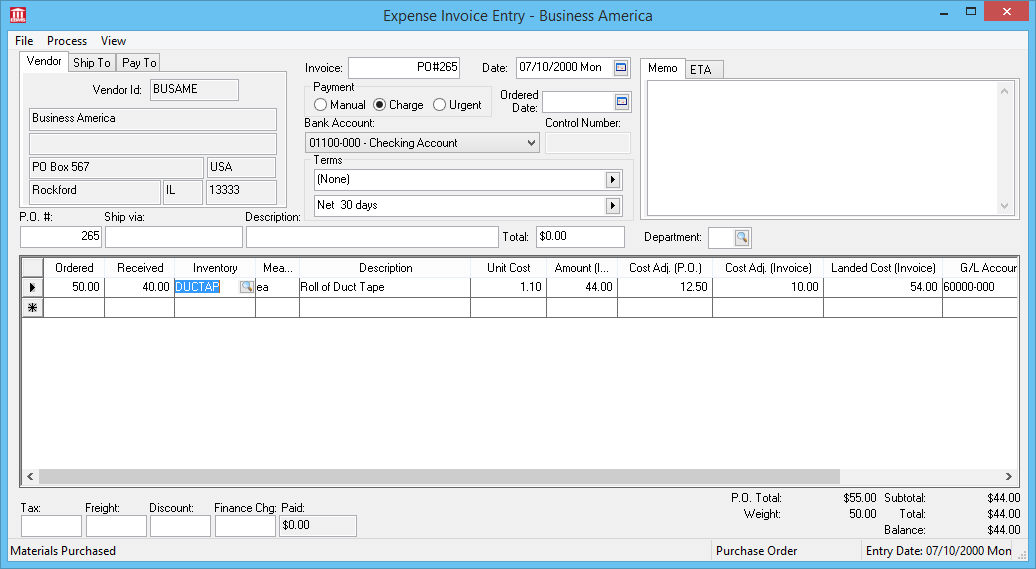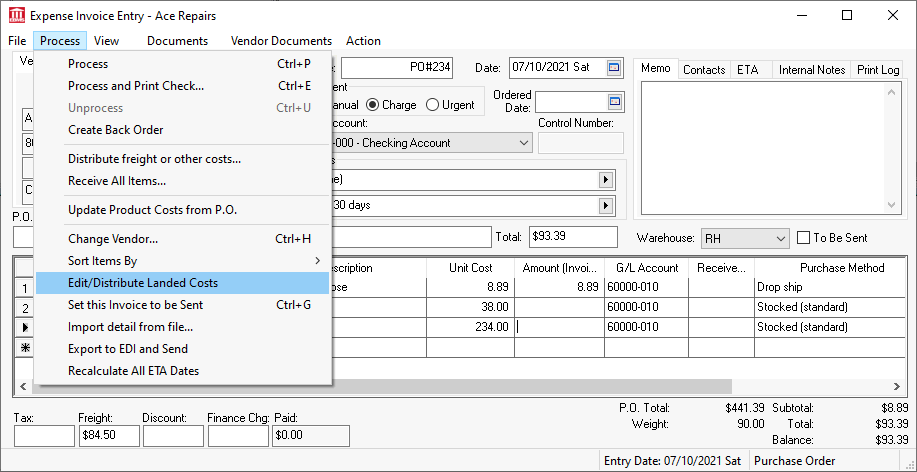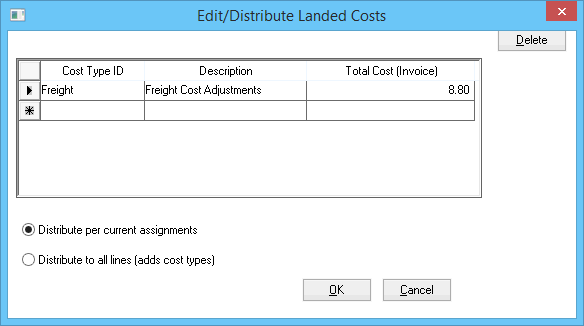Adjusting Landed Costs within a Purchase Order
The EBMS software includes the tools to adjust the purchase costs of
inventory items by adding costs such as freight or by subtracting value
for rebates, etc. The adjusting costs can be associated with an inventory
item if the landed costs are adjusted using a consistent formula. Review
the Assigning
Default Landed Costs to an Item section for setup instructions. The
landed cost can also be manually adjusted on the purchase order by using
the default landed cost type. Cost adjustment types must be setup before
adjusted landed costs can be entered within a purchase order. Review the
Cost Adjustment Types for cost
type setup instructions.
Complete the following steps to adjust landed costs:
Open a purchase order to adjust landed costs. Review the
Entering a New Purchase
Order section for more details on opening or creating a purchase
order.
Enter an inventory item that contains landed cost adjustments.
Note the inventory item - DUCTAP in the
example below:

Verify that the following landed Cost
Adjustment columns are showing within the purchase order
as shown above. Review the Standard
Features > Column Appearance section for instructions on hiding
or showing columns within a purchase order or invoice.
The Cost Adj.
(P.O) displays the total landed cost adjustment based
on the Ordered
quantity.
The Cost Adj.
(Invoice) displays the total landed cost adjustment
based on the Received
quantity.
The Landed
Cost (Invoice) lists the total cost of the product
purchase including the landed cost adjustments.
Individual landed Cost
Adjustments can be reviewed or changed for individual
purchase order lines by right clicking on the line and selecting the
Landed Cost option from
the context menu. The following dialog will appear:

The following landed cost adjustments can be changed or reviewed:
The Cost Type
ID can be changed by selecting from the Cost Type ID list. Review
the Cost Adjustment Types
section for details on changing the Cost
Type IDs.
The Description
column is populated based on the Cost
Type ID section. The description can not be changed.
The Per Unit
Adjustment is the unit value that will be added to
the unit cost within the purchase order.
The Per Unit
Adjustment can be calculated using a percentage formula
by enabling the %
option. If the percentage (%)
option is disabled the Per
Unit Adjustment will be added to the unit price instead
of being calculated based on a percentage.
The Cost Adj
(P.O.) and the Cost
Adj (Invoice) columns can be edited directly. The
system will disable the percentage (%)
option, calculate the Per
Unit Adj value, and calculate the other Cost Adj. value.
An optional Note
can be added to the landed cost record.
Repeat these steps for any additional landed cost
types. Multiple landed cost adjustments can be calculated within
any purchase order line.
Repeat the landed cost adjustments for any additional
purchase order lines.
Landed costs can be added or changed for all lines within a purchase
order or a group of lines. Complete the following steps to change a group
of lines within a purchase order:
Select the Process > Edit/Distribute
Landed Costs option from the purchase order menu as shown below:

The following dialog will appear:

The Edit/Distribute
Landed Costs utility opens a dialog with the Cost Type IDs listed that
are listed within the inventory items contained in the purchase order.
Review the Assigning
Default Landed Costs to an Item section for details on adding
added cost adjustment to an inventory item. This utility gives the
user 2 options in distributing landed costs to one or more lines within
the purchase order.
The Distribute
per current assignments option will distribute the
total amount listed within the Total
Cost (Invoice) column to only the purchase order
lines that contain the specific Cost
Type ID.
The Distribute
to all lines (adds cost types) option will add the
Cost Type ID to
every line within the purchase order and distribute the
Total Cost (Invoice) to
every line as well. This option should be used if no landed cost
adjustments have been associated within the inventory items within
the PO.
Click OK
to return to the purchase order.
Process the purchase order. The landed cost will be copied
to the Cost entry within the Pricing tab of the item if the Update
from Purchases is enabled. The purchase cost rather than the
landed cost will be copied to the product > Purchasing tab. Review
Invoices > Processing an Invoice
for details on processing the PO.
The purchase order process will add landed cost general
ledger adjustment transactions as described below:
Debit |
Credit |
Amount |
Notes |
Purchase GL on PO |
Accounts payable GL |
Cost on purchase order |
Standard purchase transactions |
Inventory Asset GL |
Inventory Variance GL |
Cost on purchase order |
Inventory asset account for track count items |
Purchase GL on PO |
Landed Cost G/L |
Amount of cost adjustment |
Landed Cost adjustment |



